In this stage of his career, JJ Barea is focused on assisting
SAN JUAN (FIBA Basketball World Cup 2019 Americas Qualifiers) - A little over four minutes are left on the clock and Puerto Rico defeats Mexico in the final game of this qualifying window to the FIBA Baske
SAN JUAN (FIBA Basketball World Cup 2019 Americas Qualifiers) - A little over four minutes are left on the clock and Puerto Rico defeats Mexico in the final game of this qualifying window to the FIBA Basketball World Cup. The Puerto Rican fans roar. They have waited an eternity for this release.
And suddenly... bam!
José Juan Barea falls tremendously on the floor after fighting a ball against two Mexican players. It hurts. He hit his hip hard. His face wails. There's a collective gnashing of teeth for one microsecond at the Roberto Clemente Coliseum. Silence reigns in this fortress of great Puerto Rican basketball battles against legends like Oscar Schmidt and Steve Nash; against “villains” like Tracy McGrady and Bobby Knight.
Barea stands with the help of his teammates and is removed from the game. He is substituted by point guard Ángel Rodríguez.
“Are you okay?” asks coach Eddie Casiano.
Without changing his game face, Barea nods, leaves the Puerto Rico bench and returns to the lines. He wants to get back into action. He’s ready. He needs to play. No one gives up here, especially with what has been happening during the past months.
About a minute after the scare, Barea returns to the forefront against Mexico. Maybe the sense of alarm was suffered only by the Boricua and Dallas fans because the player — nicknamed JJ — continued like nothing had happened.
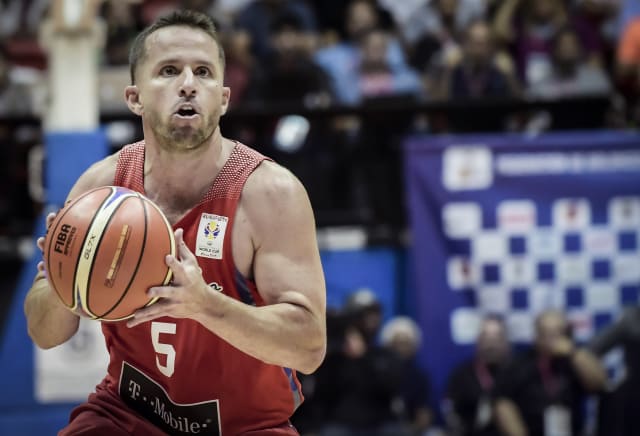
“You get hit and you get up,” he had pointed out a few days before to FIBA while sitting at a hotel lobby for the interview, in reference to Puerto Rico's recovery after Hurricane Maria. Basketball, in this suffered Caribbean paradise, sometimes reflects a stanza by Puerto Rican poet Che Melendes: “is understood suddenly, after a while of reading it.”
That’s how it happened —at least that Sunday. Barea fell, got up, and Borinquen won, 84-79, to move on to the second place in their group for the next qualifying phase. That day Barea scored 12 points and gave 11 assists, a welcome incentive for this beaten country; even more so when Barea’s contributions with the National Team are traditionally as an offensive cannon. In the first FIBA Basketball World Cup where Puerto Rico competed, Barea ended leader in average scores, with 22 points per game, although his team ended in global position number 19.
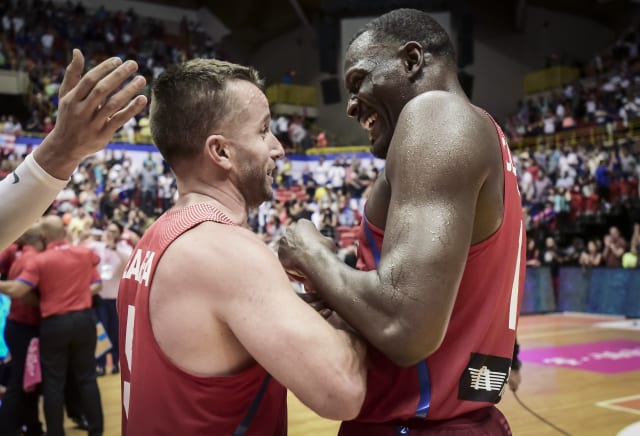
Of course, that was Puerto Rico in 2014. In this Puerto Rico, where Barea and the rest of his compatriots live now, the word “assistance” has gained many meanings after this historic year. In this Puerto Rico, his 12 assists are a metaphor for the attitude of a people in face of their misfortunes. The damned hurricane season is already here and we must help each other. Puerto Rico's citizens must aid one another because, well, after the government’s response to the disaster left by Hurricane Maria on September, there is not much hope left in official authorities. “Assistance,” is already a day-to-day word, let’s say. More of those are needed for Puerto Rico to score. And JJ has always known, since he was a kid, that in and out of the court, one must be there for one’s own.
Pause. How does this player represent the hope of an entire country? For this, the ball must be dribbled from the present to destiny's half-court, transform into Barea, and pass the ball to Mr. Past for him to score a three-pointer. Assists —that’s what it's all about.
***
It's early in this summer day in 2004, and there’s José Juan, sleeping away in his Rincón apartment. The phone rings. It’s his mom, Physical Education teacher Marta Mora. It's time to get up: Puerto Rico plays against United States in the Athens Olympic Games: it’s a national issue.
At the time, many people didn't believe that Piculín Ortiz, Carlos Arroyo and the rest had the opportunity of charging the so-called “Dream Team”, that counted on the talents of a young player called LeBron James, an offensive beast named Allen Iverson, and a legend in his peak performance such as Tim Duncan. It would have been a grotesque obscenity to believe that the Dream Team would have lost in an Olympics... and against Puerto Rico?
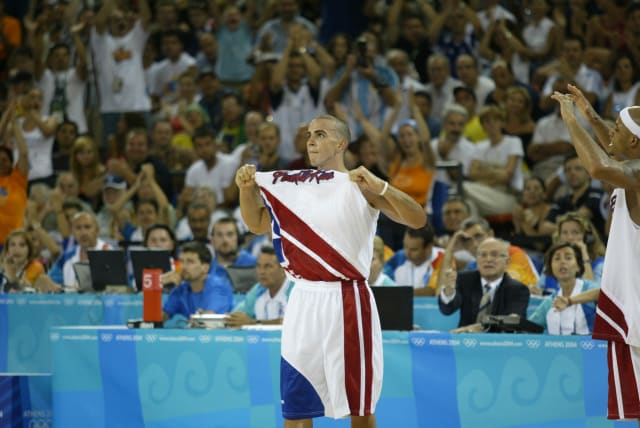
“We didn’t miss. We won! Man, that game...,” reminisces Barea, taking a break to sigh like every Puerto Rican does when they remember when Arroyo displayed the Puerto Rican jersey while the Boricuas beat that frustrated handful of multimillionaire stars.
For those who don't know, the Puerto Rican National Team is the equivalent of the Argentine eleven albicelestes. Here: Piculín and Arroyo. There: Maradona and Messi. The "12 Magnificos". Nothing to worry about. And then, there's this colonial issue. I mean, beating the United States in any sports event —but even more so in basketball— could be quite cathartic for Puerto Ricans.
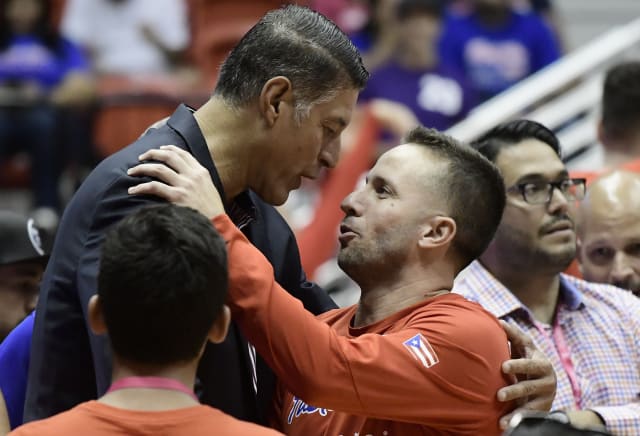
“It was like seven or eight in the morning in Puerto Rico. No, no... Six in the morning, it was very early. I remember what that game did for everyone, but particularly for me. That game gave me a push, a fever. It let the world know that there's real basketball being played in Puerto Rico, and I believe that it opened more doors for all of us,” pointed out the Dallas Mavericks point guard, now more reflective after the brief ecstatic minute that since that historic day happens normally in any conversation about that Puerto Rican triumph in Athens.
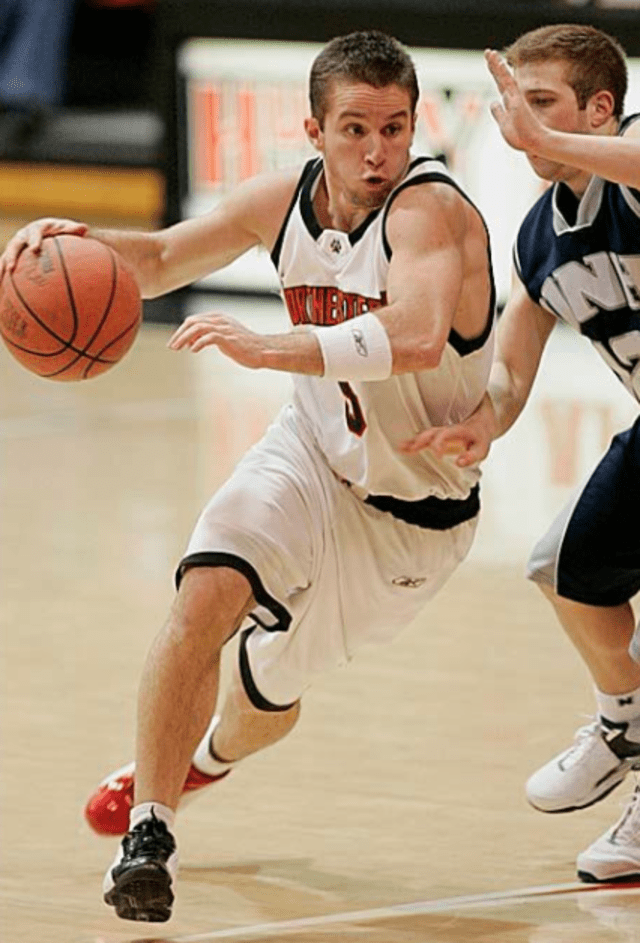
Barea remembered that “in 2004 I was in the middle of my college career” with Northeaster University and that stone throw of the Puerto Rican David to the anglosaxon Goliath “was something super,” that motivated him not to be intimidated by any opponent of the fiery NCAA league.
“I always asked to be presented in the games like I was from Puerto Rico. When they asked me about my training, I said that everything I learned was in Puerto Rico,” he assured.
He was a phenomenon since he was a kid. His fast development in the minor leagues in the western part of the island took him to spend his last high school year playing in Florida, with the Miami Christian High School and with coach Pilín Álvarez, in the Miami Tropics. When praising the youngster development programs that flourish in Puerto Rico, Barea doesn't skip a beat.
“You take any children's team from Puerto Rico to compete to the United States, and they're going to win or at least be among the best. When they reach the teenage years is when things get a bit tighter. We don’t have many tall players, like we know,” acknowledged the former point guard at Mayagüez's Colegio La Inmaculada.
Well, with his little less than six feet, Barea managed that ball in that Boricua squad that took the Miami Tropics to the High School State Championships.
“For me, that was a great moment of adapting to basketball in the United States. I'm very thankful for those moments next to my other teammates from Puerto Rico. The team's starters were all Puerto Ricans,” he stressed, mentioning Carlos Rivera, Jesús Verdejo, Sammy Hernández and Iván López, the other four players of that epic school team from Miami.
The NCAA, however, is not high school. Although his muse was the Boricua triumph against the United States in the Athens Olympics, his physical characteristics in a position saturated with talent placed him in a disadvantageous position when being considered at the NBA Draft. In the court, his Tasmanian Devil style was effective: he averaged 20.3 points, 6.4 assists and 3.9 rebounds per game in his college career.
But still, there were some pieces needed to help him take the next step. Onwards! Oh, glorious National Team!
“When I was in college I also played with the Puerto Rico National Junior Team and then with the U-21. And I felt very good with [coach] Calcaño. It was a process, because I was with him and in that team with several veterans. I think that helped me a lot to adapt later to play in the NBA Summer League, first with Golden State and then with Dallas. They didn’t pick me in the Draft. I had to sweat it,” the Puerto Rican pointed out.
At that moment, Barea already longed to wear the jersey of the Senior Puerto Rico National Team, and like they say in his native Mayagüez, “zumbar pa’ lante” (go all in). Despite that there was not much space in Puerto Rico's back court due to the killer international combination represented by Arroyo and Larry Ayuso, several retirements from the National Team of players that marked an era, such as center Piculín Ortiz, point guard Eddie Casiano, and small forward Rolando Hourruitiner, opened the space to think about the relay. The experts echoed praises about Barea, as well as about players in the paint like Peter John Ramos and Ricky Sánchez. And this is a true feat for a play-maker in a species that produces point guards everywhere... be it an Angelo Cruz from the Bronx or a Filiberto Rivera from Carolina, that position exudes the song of the coquí.
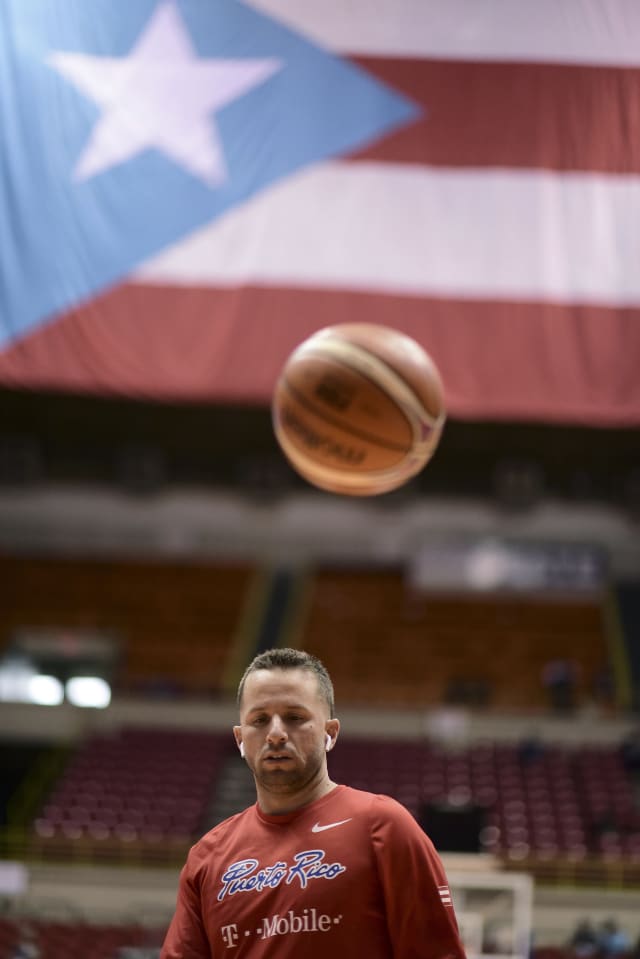
“I remember that in 2006 I told Dallas that I could only play three games in the Summer League because I was leaving for the Central American Games with the National Team,” recalls Barea, regarding the first time he wore the single-star uniform with the Senior team.
That year was transcendent for Barea to seal his commitment with the National Team. With an “A team” in Japan against the FIBA world — and against themselves — Puerto Rico sent Barea and a “B team” to the Central American and Caribbean Games in Cartagena, Colombia. That team reached the tournament's final against Panama, in an event in which Puerto Rico was not the region’s favorite. With his country’s eyes on him, Barea made a 3PT shot while being guarded by Panamanian ninjas during the last breaths of the minute, thus ending the game and giving Puerto Rico the gold.
“That game was very important for me. That moment... I believe that it’s key for me in the National Team,” he said.
From there on, Barea has been a constant figure in the "12 Magnificos". In the 2008 Olympic Qualifying Tournament for Greece, Barea played next to Carlos Arroyo, Larry Ayuso and Daniel Santiago, three pillars of the generation before his. They didn’t qualify, but the player from Mayagüez tasted here for the first time what would eventually be the next generation.
In 2010, Puerto Rico faced a hurdled World Cup in Turkey, but Barea was already on his way to be one of the main offensive weapons of the island. For the 2014 FIBA World Cup in Spain, Barea already had the international confidence he needed because, despite failing two years before in his attempt of Puerto Rico qualifying to the Olympics; the championship he won with Dallas in 2011 and a solid NBA career aided him in his game’s idiosyncrasies.
“At that point I already was very confident about my game,” he explained.
“For me, that Dallas championship taught me many things. We played very calmly in that final. I thought: ‘if we win that’d be great, but if we loose; man, I lost at an NBA final!'” Barea recalls.
With that mentality, JJ dominated the points in that World Cup— even though Puerto Rico and their load of problems ended in the 19th position. But that was four years ago. As we stated before, that Puerto Rico is not the same as this one, and that Barea is not the same either.
***
It’s Thursday, June 29, 2018 and Bad Bunny’s music is playing in some car at the parking of the Hotel Verdanza in the tourist area of Isla Verde. “Estamos bien (we're good),” the world trap icon tries to sing, a fact that now transports us to this era of the second decade of the 21st century: Post-Maria Puerto Rico.
About the poetry both outside and inside the hotel where José Juan Barea is staying —NBA champion, leading scorer of the 2014 FIBA Basketball World Cup, and captain of the Puerto Rico National Team—, he recites his mantras to FIBA. He’s just turned 34 and he feels more like an oak tree, wiser.
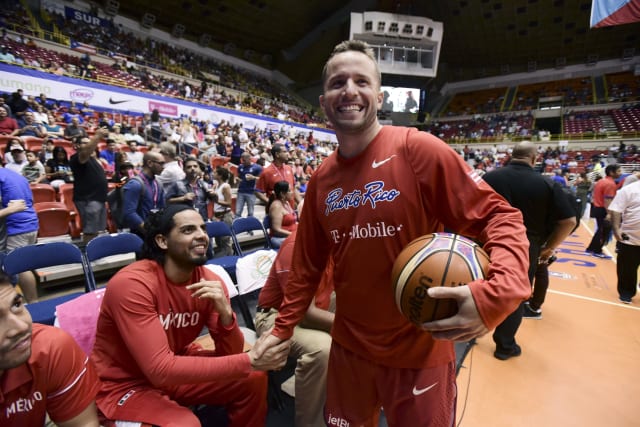
“I don’t celebrate as much. Now I do my little gatherings with my family, in Rincón... Those types of things, easy,” Barea smiles, sitting at the table of the Verdanza lobby.
“Yesterday was my birthday and I was at a press conference with the National Team. And at a practice. And there’s a game today. We're here on a mission,” says Barea after taking the accustomed pictures for the last two games of the final qualifying window that completes the first round for the FIBA Basketball World Cup 2019.
The day before was his birthday, but this day, hours before this moment, the son of Marta Mora and Jaime Barea, played his first game in the FIBA Basketball World Cup Americas Qualifiers 2019 while wearing the uniform of the National Team in front of his compatriots.
“Today I play for the first time in Puerto Rico with the National Team,” Barea repeats during this interview with FIBA. As they say in his country, Barea is culeco (elated).
And for the Puerto Rico National Team fans, well... This is a breath of fresh air. A big one. Eight months before, hurricane Maria ravaged this Caribbean archipelago. Millions were left with no electric power or running water. There are thousands left with blue tarps on their ceilings. More than anything —and as if it weren’t enough with the great challenge presented by the already explained and grotesque colonial condition— the spirit of the Puerto Rican people was on the line. In fact, with a fallen electric system, a mess in the government finances and the power battles caused by scarcity, the Puerto Rican inhabitants themselves can speak about how every day that virtue of resilience is put to the test.
Barea remembers how, in the middle of the pre-season camp with Dallas and when starting the tournament, he saw pain in the faces of his people.
“The faces of the Puerto Ricans that you would see in the cities you visited said it all: Puerto Rico was screwed. Also, I believe that because of Maria many people in the United States realized he help that we needed; then and now. We weren’t well before and with Maria a lot of people realized it,” he discerned.
With not much to say, his good friend and Mavs owner Mark Cuban, put the organization's resources to his disposition. In the days after the stor, Barea sent to Puerto Rico five planes with more than 300 thousand pounds of supplies to distribute among those who were most affected. The JJ Barea Foundation received also the 10 thousand dollars that the program NBA cares gave for the month of October to help the cause. Cuban and the Mavs also donated everything gathered in tickets in the October 25, 2017 game against the Memphis Grizzlies in the American Airlines Center. After those efforts, the player has been cooperating in several ways with his country’s recovery. In June 2018, Barea received the K. Walter Kennedy Citizenship Award, after being selected by the Pro Basketball Writers Association (PBWA) in honor of the NBA’s second commissioner.
Barea didn’t speak about these gestures in the interview because this is something natural, a responsibility, a duty. These assists are not part of the box-score.
***
Ten thirty-something at night. July 2, 2018. Barea is sitting at a long table, answering press questions. His two-year old daughter, Paulina, is sitting on his lap; coach Eddie Casiano and shooting guard Gian Clavell to his right.
“They're insolent. They throw them like nothing. Him and David Huertas, they're two insolents,” Barea jokes after their triumph against Mexico, where Clavell and Huertas scored 17 points each and combined to throw 14-9 from the 3-point line.
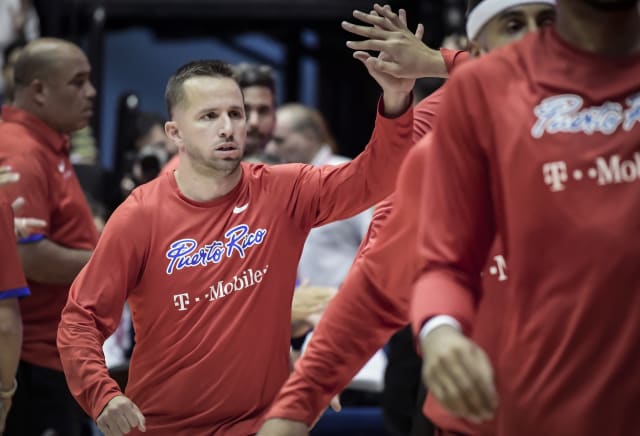
Casiano is enjoying it. JJ laughs like he doesn't feel the blow he suffered in the game’s first quarter, when he tremendously fell on his hip. Clavell tries to explain that he's not that insolent, that Barea hands him the ball too easy. With the chisel of Barea’s assist, the current era of Boricua basketball is being sculpted. Now he must also share his game with the Mavericks’ management. The first qualifying window of the second round towards the FIBA Basketball World Cup is in September. Barea believes that he should have no problems in playing on September 14 in Puerto Rico, against Panama. But for the game on September 17, in Argentina, there could be some conflict.
“It’s quite far from Dallas. But I'm going to try,” he says after the press conference.
Barea leaves with Paulina in his arms and takes some pictures with the fans before going. This task for the Puerto Rico National Team is already done. He knows, however, that there are still many assists to be done.
By Hermes Ayala / Photos: Carlos Giusti (Puerto Rico) / Northeastern University
FIBA